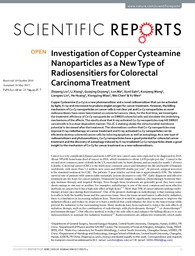| dc.contributor.author | Liu, Zhipeng | |
| dc.contributor.author | Xiong, Li | |
| dc.contributor.author | Ouyang, Guoqing | |
| dc.contributor.author | Ma, Lun | |
| dc.contributor.author | Sahi, Sunil | |
| dc.contributor.author | Wang, Kunpeng | |
| dc.contributor.author | Lin, Liangwu | |
| dc.contributor.author | Huang, He | |
| dc.contributor.author | Miao, Xiongying | |
| dc.contributor.author | Chen, Wei | |
| dc.contributor.author | Wen, Yu | |
| dc.date.accessioned | 2017-09-11T22:24:36Z | |
| dc.date.available | 2017-09-11T22:24:36Z | |
| dc.date.issued | 2017-08-24 | |
| dc.identifier.citation | Published in Scientific Reports 7, Article number 9290: 1-14, 2016 | en_US |
| dc.identifier.uri | http://hdl.handle.net/10106/26897 | |
| dc.description.abstract | Copper Cysteamine (Cu-Cy) is a new photosensitizer and a novel radiosensitizer that can be activated
by light, X-ray and microwave to produce singlet oxygen for cancer treatment. However, the killing
mechanism of Cu-Cy nanoparticles on cancer cells is not clear yet and Cu-Cy nanoparticles as novel
radiosensitizers have never been tested on colorectal cancers. Here, for the frst time, we investigate
the treatment efciency of Cu-Cy nanoparticles on SW620 colorectal cells and elucidate the underlying
mechanisms of the efects. The results show that X-ray activated Cu-Cy nanoparticles may kill SW620
cancerscells is in a dose-dependent manner. The JC-1 staining shows the mitochondrial membrane
potential is decreased after the treatment. The observations confrm that Cu–Cy nanoparticles may
improve X-ray radiotherapy on cancer treatment and X-ray activated Cu-Cy nanoparticles can be
efciently destroy colorectal cancer cells by inducing apoptosis as well as autophagy. As a new type of
radiosensitizers and photosensitizers, Cu-Cy nanoparticles have a good potential for colorectal cancer
treatment and the discovery of autophagy induced by X-ray irradiated Cu-Cy nanoparticles sheds a good
insight to the mechanism of Cu-Cy for cancer treatment as a new radiosensitizers. | |
| dc.description.sponsorship | This work was supported by the Development and Reform Commission of Hunan (Grant 201583) the Fundamental Research Funds for the Central South University (grant 2016zzts537), the Furong Scholarship from Central South University as well as the support from the U.S. Army Medical Research Acquisition Activity (USAMRAA) under Contracts of W81XWH-10-1-0279 and W81XWH-10-1-0234, and a grant from the Science and Technology Department of Nanning (grant no. 20151266). | en_US |
| dc.language.iso | en_US | en_US |
| dc.publisher | Scientific Reports | en_US |
| dc.rights | Attribution 4.0 United States | * |
| dc.rights.uri | http://creativecommons.org/licenses/by/4.0/us/ | * |
| dc.subject | CU-CY nanoparticles | en_US |
| dc.subject | Colorectal cancers -- Treatment | en_US |
| dc.subject | Colorectal cancers -- Radiation treatment | en_US |
| dc.title | Investigation of Copper Cysteamine Nanoparticles as a New Type of Radiosensitiers for Colorectal Carcinoma Treatment | en_US |
| dc.type | Article | en_US |
| dc.publisher.department | Department of Physics, University of Texas at Arlington | en_US |
| dc.identifier.externalLinkDescription | The original publication is available at Article DOI | en_US |
| dc.identifier.doi | DOI:10.1038/s41598-017-09375-y | |


